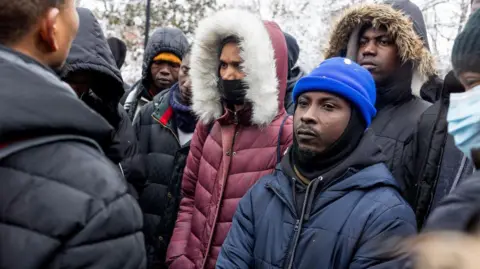In light of the near approach of the US presidential election, African asylum seekers living in the United States feel a sense of anxious tension about their future. While many came to America hoping to escape conflicts, persecutions, and economic adversities in their motherlands, they have now been left in the crossfire of politically charged politics.’ All those who have heard and even seen some immigration policy uncertainty and potential change of administration are vulnerable and concerned for their safety.
Uncertain Immigration Policies
Increasingly hot debates over immigration have characterised the weeks leading up to the election, and candidates now present varied views on asylum policies. For asylum seekers, this is a looming fear that there will be increased restrictions or even harsher measures of enforcement. Many are fearful that a change in leadership may reverse the more lenient policies that allowed them to seek refuge in the US over the past few years.
These concerns are even further exacerbated by the recent developments of previous administrations seeking more stringent immigration rules and putting many asylum seekers on extremely long legal processes that hold uncertain outcomes. Recently, arrivers may face continued uncertainty and fear of getting deported.
Personal Narratives of Struggle
While the stakes are much higher for many of those African asylum seekers, Amina is a 28-year-old Sudanese woman who had to leave her homeland over violence and political oppression. She has been in the US for over a year now, trying to piece together a life with asylum application processes that have turned out to be highly complex. The election, to be held soon, puts her in a situation where she worries whether the new administration might overturn the decision on her case or if new barriers are set up before her.
Similarly, Samuel, an Eritrean who is 35 years old, has faced many battles since his entry here. Though hopeful, he increasingly feels anxious about what change might come post-election. “I just want to feel safe and build a future for my family, but everything is up in the air now.”
Community Support and Advocacy
Community organisations, advocacy groups, and anti-war groups have responded to the increasingly anxiety-ridden asylum seeker with more efforts in their support and resource provision towards and information dissemination to them. Legal aid clinics for asylum applications are being organised, and all attendees have been invited to workshops and informational sessions that would arm them with knowledge of what they can do and current political realities.
These organisations also advocate for more humane immigration policies, insisting that the refuge of those fleeing persecution should be granted. As election time approaches, they keep calling on voters to favour compassion and understanding over fear and division.
Future Perspective
With elections looming, African asylum seekers in the United States hold onto hope but have anxieties about their futures. ‘An uncertain outcome leaves them navigating a complex and often intimidating system while hoping they will find safety and stability. The voices of these individuals highlight the need for a more inclusive and empathetic approach to immigration, one that recognises the humanity and resilience of those seeking a better life.
The stories of African asylum seekers remind one of the hardships encountered by many who try to seek refuge and show the critical importance of advocacy as policymakers make decisions that might strongly impact their lives. There is an urgent need during this political season, when everything is in disarray that people will consider voting decisions on the implications for immigrant policies and the life in the lives of immigrants whom such policies affect.















